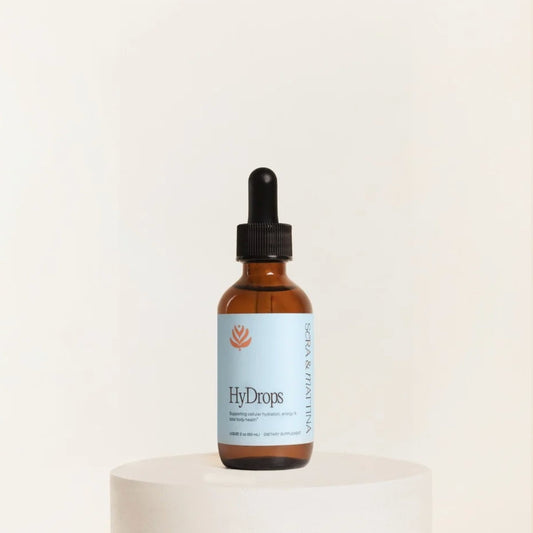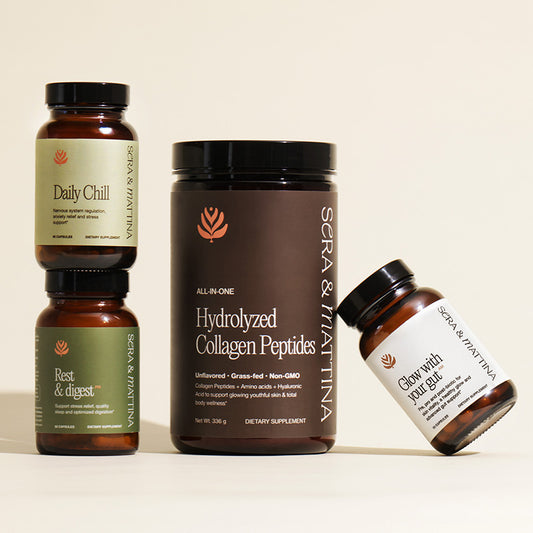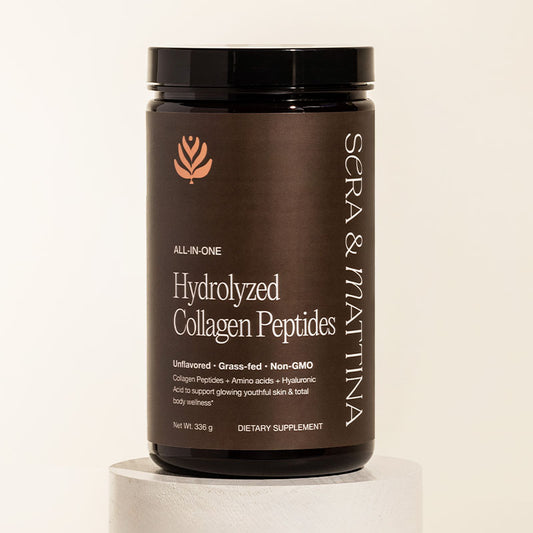Your gut is a bustling metropolis. It's home to its own nervous system (the enteric nervous system), millions of immune cells, and trillions of microorganisms that keep you healthy and happy.
If you care about gut health, you're probably already eating for a diverse and robust gut microbiome.
But did you know the health of the microbes in your gut depends on more than just what you eat?
Today, we'll cover our non-diet-related tips to support your gut.
Tip 1: Optimize Your Sleep
Sleep helps your cells to repair, recharge, and restore. And it's no different for the trillions of microscopic organisms in your gut. Like us, these critters also run on a circadian rhythm. If you're neglecting sleep, it leads to gut microbiome changes (1).
Ideally, adults need 7-8 hours of quality sleep each night. However, you're unlikely to enter a deep, restorative sleep if you look at bright screens before bed or sleep in an unsuitable environment.
You can get better sleep by following our sleep tips:
1. Stick to a consistent sleep schedule to retrain your circadian rhythm.
2. Get natural light exposure when you wake up.
3. Make your room as dark as possible at night – remove all electronics and use blackout curtains.
4. Invest in a comfortable mattress and bedding.
5. Avoid blue light from screens and bright room lighting at least 1 hour before bed.
6. Have a warm shower or bath before bed to relax your body.
7. Use an all-natural sleeping aid containing ingredients like magnesium and l-theanine.
8. Optimizing your sleep takes dedication, but it’s worth it for the benefits to your gut, immunity, energy, and more.
Tip 2: Exercise Regularly
There are a million good reasons to exercise regularly – and we're here to give you one more. Physical activity changes the composition and activity of your gut microbiome in favor of healthy microbes and fewer pathogenic microbes (2).
Exercise also lowers overall inflammation and promotes gut motility. It's an ideal remedy for bloating and constipation.
You don't have to sign up for a 5K or become a competitive athlete! Just 30 minutes of moderate-intensity exercise 5 times per week may increase both the richness and diversity of the gut microbiome (3).
We love walking in nature, dancing, doing yoga flows, and short weight training sessions. Most of all, pick an exercise you enjoy.
Tip 3: Manage Your Stress
Your gut is your second brain. Mental and emotional stress is a disaster for digestion and gut microbiome health due to the gut-brain axis. You may have seen this in action when you have to run to the bathroom before a big work presentation.
Taking time to relax and unwind daily is crucial to support gut health. Excellent stress-relief tools are exercise, mindfulness meditation, journaling, yoga, breathwork, walking in nature, and reading.
Tip 4: Hydrate, Hydrate, Hydrate!
Staying well-hydrated is one of the best ways to avoid constipation and bloating. Water helps you form digestive enzymes and adds much-needed lubrication to move food through the digestive tract.
Drinking 8 glasses of pure water daily (including herbal tea) is the best way to hydrate. But make sure you drink distilled, reverse osmosis, or natural spring water free from toxins that may disrupt the balance of bacteria in the gut.
Tip 5: Be Cautious About Antibiotics
Antibiotics are one of the most important discoveries of the 20th century. That said, it seems like some doctors hand them out like candy. This affects your gut health and contributes to deadly antibiotic-resistant bacteria.
Antibiotics destroy the good with the bad, and can leave your gut microbiome in a mess. So, tread carefully and avoid unnecessary or excessive antibiotic use.
Tip 6: Steer Clear of Harsh Chemicals
Exposure to harsh chemicals and environmental toxins from home cleaning and personal care products can mess with the delicate balance of bacteria in your gut and on your skin. Yes, your skin also has a microbiome (read more about it in our blog on the gut-skin axis).
Always read the labels on your home and personal care products. Aim for chemical-free products made with plant extracts and essential oils.
Tip 7: Use Supplements for Support
Supplements should never replace a healthy diet and lifestyle – but they are useful to support a healthy gut routine.
We recommend taking a high-quality, symbiotic supplement that has probiotics for a healthy balance of good bacteria, prebiotics to feed the good bacteria, and postbiotics to tend to the overall gut lining and integrity of the gut itself.
You can find all of these in our Glow With Your Gut AM supplements.
You can also take digestive enzymes which can help you to break down foods easier, and, in doing so, reduce digestive symptoms such as gas and bloating. These enzymes can be found in our Rest & Digest PM supplements.
Conclusion
In summary, supporting gut health goes beyond what you put in your mouth. You can nourish your gut with stress management, sleep, exercise, pure water, probiotics, and avoiding frequent antibiotics.
Incorporating our non-diet tips for gut health into your daily routine may reduce and even reverse digestive problems. Overall, a healthy gut is a good thing for your mental and physical well-being.
xx
Imagery Reference - Pinterest https://pin.it/2Iz98Zwrm







